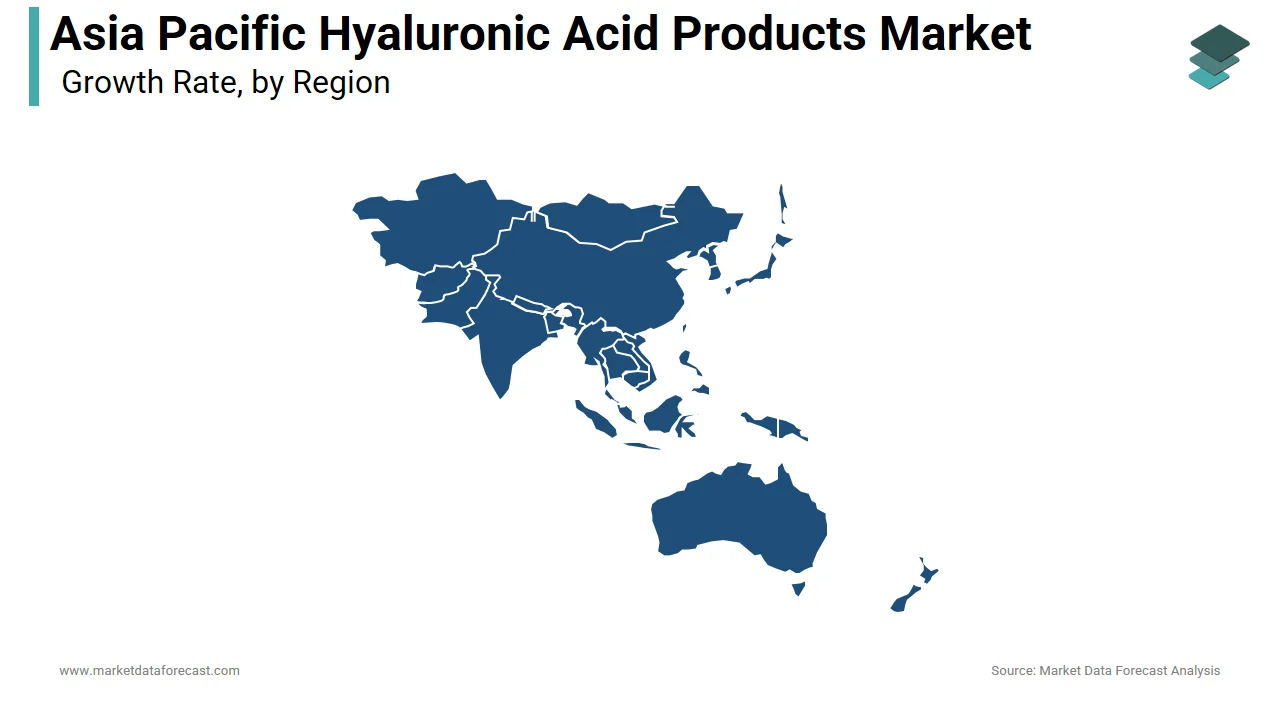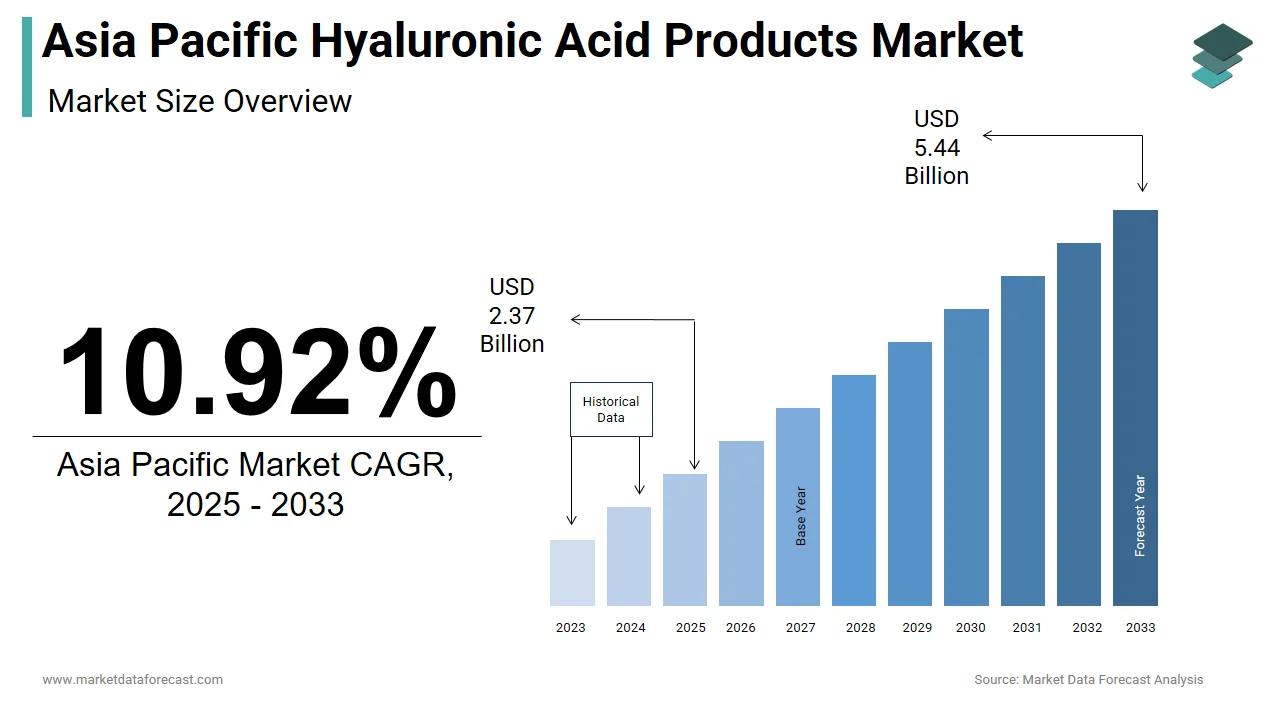Asia Pacific Hyaluronic Acid Products Market Size, Share, Trends & Growth Forecast Report By Product type, Application and Country (India, China, Japan, South Korea, Australia, New Zealand, Thailand, Malaysia, Vietnam, Philippines, Indonesia, Singapore & Rest of APAC) - Industry Analysis From (2025 to 2033)
Asia Pacific Hyaluronic Acid Products Market Size
The size of the Asia Pacific hyaluronic acid products market was worth USD 2.14 billion in 2024. The Asia Pacific market is anticipated to grow at a CAGR of 10.92% from 2025 to 2033 and be worth USD 5.44 billion by 2033 from USD 2.37 billion in 2025.
MARKET DRIVERS
Growing Applications in Dermatology and Orthopedics Driving Market Growth
Hyaluronic acid products have a wide range of applications in dermatology, orthopedic procedures, tissue engineering, and ophthalmology. Hyaluronic acid levels have been found to decrease with age, and consumers rely on hyaluronic acid-based dietary supplements or extra-oral injections to overcome hyaluronic acid deficiencies.
Hyaluronic acid injections are used in eye surgeries for cataract removal, corneal transplantation, repair of retinal detachment, and other eye injuries.
Hyaluronic acid injections have been widely used in osteoarthritis of the knee and effectively control pain and improve function. It is commonly prescribed as an intra-articular therapy for knee osteoarthritis. In terms of dermatology, hyaluronic acid products are used as dermal fillers to uplift sagging skin, erase fine lines, and build up facial muscle loss for the aging population and high awareness of beauty enhancements. Hyaluronic acid as fillers is generally biocompatible, which means that no allergy skin test is required before treatment.
Young and older age people are becoming more conscious of facial wrinkles and folds, and to improve the appearance of lips, this is one of the fastest driving factors driving the APAC hyaluronic acid products market during the forecast period. In addition, other factors driving market growth include the increasing geriatric population, increased demand for minimally invasive procedures, and increased availability of hyaluronic acid products. All these factors are estimated to drive the market in the APAC region.
MARKET RESTRAINTS
Lack of Awareness and High Costs Hindering Market Growth
However, there is a lack of knowledge about hyaluronic acid and poor healthcare infrastructure, especially in underdeveloped and rural areas. This is one of the main constraints faced by the APAC hyaluronic acid market. In addition, hyaluronic products can also show some minor side effects like itchiness, swelling, redness, and loss of sensation, among others. Due to this factor, there are strict rules for product approval, making the product expensive. Therefore, high prices and counterfeit products will negatively impact the market during the forecast period.
GEOGRAPHICAL ANALYSIS

Geographically, the Asia-Pacific is predicted to experience tremendous growth during the forecast period. The Chinese hyaluronic acid fillers market is expected to grow at the highest CAGR of 8.5% during the forecast period. In China, the cosmetic surgery industry is progressing at a rapid pace, and the demand for cosmetic treatments using hyaluronic acid is booming. The Chinese market has great potential due to its large size, aging population, and sedentary lifestyle. The market size of hyaluronic acid for medical beauty was 5.5 billion yuan in 2019 and is expected to more than double in the next five years. According to a recent Chinese report, from 2025 to 2033, the amount of hyaluronic acid sold annually in China increased from 135 tons to 315 tons, with an average annual growth of 26%.
Japan is likely to have the fastest-growing region because the country has one of the large aging population in the world. The regional economy is becoming an R&D-intensive economy, which is the primary driver of market growth in Japan. Factors such as increasing disposable income, influencing median income, and changing consumer habits drive this market.
Over the forecast period, the Indian hyaluronic acid products market is estimated to grow at a CAGR of 8.7%. The increase in disposable income, a high proportion of middle-aged people, increase in the prevalence of bone-related, the constant evolution of healthcare services, and growth in R&D activities would lead to the expansion of the Indian hyaluronic acid market during the forecast period.
KEY MARKET PLAYERS
Companies playing a pivotal role in the Asia Pacific hyaluronic acid products market profiled in this report are Allergan, Sanofi, Ferring B.V., Zimmer Biomet, Fidia Farmceutici, Salix Pharmaceutical, Anika Therpeutics, Seikagaku Corporation, Hoffmann-LA Roche Ltd, Alcon, Inc., Smith & Nephew plc and F.Merz Asthetics, Inc.
MARKET SEGMENTATION
This Asia Pacific hyaluronic acid products market research report is segmented and sub-segmented into the following categories.
By Product Type
- Single Cycle Injection Products
- Three-Cycle Injection Projects
- Five Cycle Injection Products
By Application
- Osteoarthritis
- Ophthalmic
- Dermal Fillers
- Vesicoureteral Reflux
By Country
- India
- China
- Japan
- South Korea
- Australia
- New Zealand
- Thailand
- Malaysia
- Vietnam
- Philippines
- Indonesia
- Singapore
- Rest Of APAC
Related Reports
Access the study in MULTIPLE FORMATS
Purchase options starting from $ 2000
Didn’t find what you’re looking for?
TALK TO OUR ANALYST TEAM
Need something within your budget?
NO WORRIES! WE GOT YOU COVERED!
Call us on: +1 888 702 9696 (U.S Toll Free)
Write to us: [email protected]

